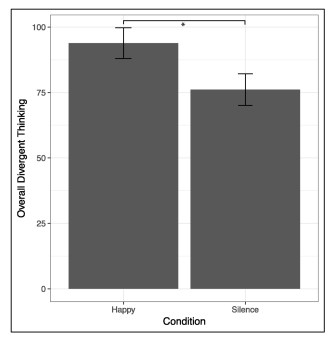Stuck for An Idea? Try Listening to Some Happy Music.

Creative thinking has long fascinated us. In the Middle Ages, creativity was believed to have a divine source, appearing only in people with an open line of communication with God. It wasn’t until the Renaissance that creatives were given credit for their work. Modern studies have shown that this kind of thinking is simply something the normal human mind is capable of, though there are some studies that suggests that we’re actually becoming less creative than we used to be. In any event, everybody seems to want to enhance creative thinking, and the psychologists behind the new study were interested in seeing what role music could play since there’s been a fair amount of research into music’s impact on the brain.
A study just published in PLOS One suggests that happy music can be the key that unlocks divergent thinking, the kind of thinking that results in creative solutions and ideas. Psychologists studied 155 people in their late teens and 20s and found a clear correlation between how they thought and what they were listening to.
For the new study, Simone Ritter from Radboud University in Nijmegen and Sam Ferguson at the University of Technology in Sydney assessed their subjects for two types of thinking:
To demonstrate why we’d want to enhance divergent thinking, the study’s authors cite an example: The problem not having enough resources to repair high-tech incubators in developing countries with high neonatal death rates. Convergent thinking, or digging deeper, might involve improving the technology to make the incubators more reliable, or train more local people to repair them. Divergent thinking might lead to the designing of new incubators based on car parts with which locals are already familiar.
The researchers had their subjects attempt to solve a series of puzzles that required one of the two types of thinking to solve.
The Puzzles
There were three types of tests for convergent thinking:
For divergent thinking, subjects were given an Alternate Uses Task that instructed them to find many uses as they could for a common household brick.
The Music
As subjects worked, pieces of classical music were played in the background. Each was selected for its emotional effect as determined by previous study.

The Findings
First off, none of the music had any discernible effect on the performance of convergent tasks. Divergent thinking, though, was another story altogether.
Using a an Overall Divergent Thinking scale (ODT), where high scores are better, subjects listening to happy music had a rating of 93.87. Working in silence? A paltry ODT rating of 76. Vivaldi’s Four Seasons for the win.

The research didn’t get into why this happens, though its authors suggest that divergent thinking may provide the only way out of a sticky problem, “When getting stuck in a rut, it can be helpful to, instead of digging deeper, dig elsewhere.”





